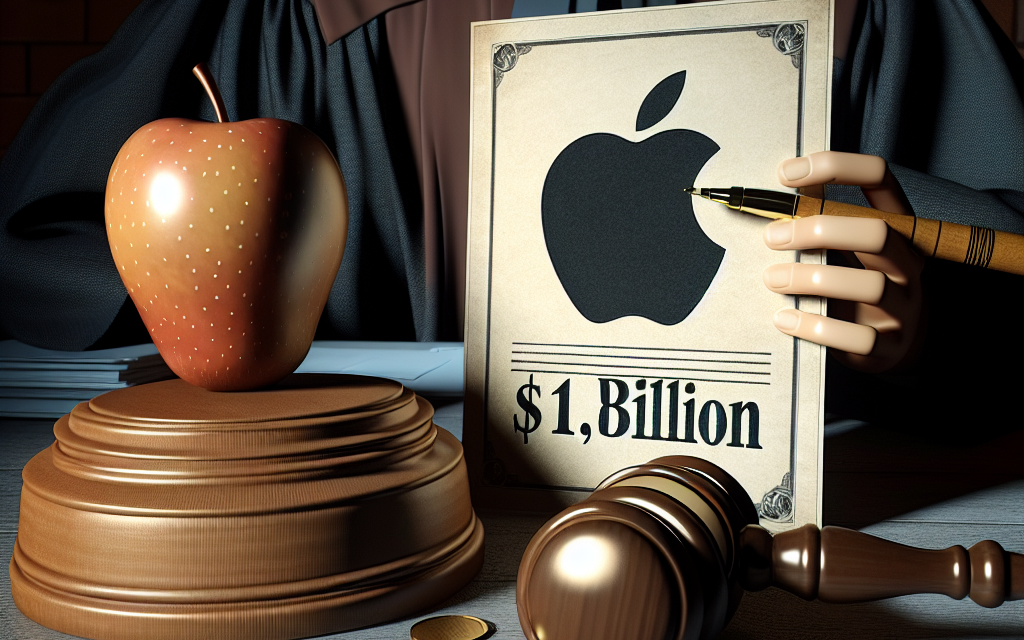“Apple Faces $1.8 Billion Class Action Trial in the UK: A Legal Battle for Consumer Rights.”
Introduction
Apple is facing a significant class action trial in the UK, with claims amounting to £1.8 billion. The lawsuit, brought forth by a group of consumers, alleges that the tech giant engaged in anti-competitive practices related to its App Store policies, which they argue have resulted in inflated prices and restricted choices for users. This trial marks a pivotal moment in the ongoing scrutiny of major technology companies and their market practices, as it could set a precedent for future legal actions and regulatory measures in the tech industry. The outcome may have far-reaching implications for Apple’s business model and its relationship with developers and consumers alike.
Apple’s Legal Battle: Understanding the $1.8 Billion Class Action Trial
Apple is currently embroiled in a significant legal battle in the United Kingdom, facing a class action lawsuit that could potentially cost the tech giant up to $1.8 billion. This trial, which has garnered considerable attention, centers around allegations that Apple has engaged in anti-competitive practices that have adversely affected millions of consumers. The lawsuit, spearheaded by a group of claimants, asserts that Apple has unlawfully imposed restrictions on app developers, thereby inflating prices and limiting choices for users of its devices.
To understand the implications of this trial, it is essential to consider the broader context of Apple’s business practices. The company operates a tightly controlled ecosystem, particularly through its App Store, where it mandates that developers adhere to specific guidelines and pay a commission on sales. Critics argue that these practices stifle competition and innovation, as they create barriers for smaller developers who may struggle to compete against larger entities that can absorb these costs. Consequently, consumers may find themselves facing higher prices and fewer options, which is at the heart of the claims being made in this class action suit.
As the trial unfolds, it is crucial to recognize the potential ramifications for both Apple and the tech industry as a whole. If the court rules in favor of the claimants, it could set a precedent that challenges the way major tech companies operate their platforms. This outcome may lead to increased scrutiny of similar practices across the industry, prompting other companies to reevaluate their business models to avoid similar legal challenges. Furthermore, a ruling against Apple could pave the way for more consumer-friendly policies, fostering a more competitive environment that benefits both developers and users.
In addition to the financial implications, the trial also raises important questions about consumer rights and corporate responsibility. The claimants argue that Apple’s practices not only harm individual consumers but also undermine the principles of fair competition that are essential for a healthy market. This case highlights the ongoing debate surrounding the power dynamics between large corporations and the consumers they serve. As consumers become increasingly aware of their rights and the impact of corporate practices on their daily lives, the outcome of this trial could serve as a catalyst for broader discussions about accountability in the tech industry.
Moreover, the legal proceedings are likely to attract significant media attention, which could influence public perception of Apple. The company has long been viewed as a leader in innovation and design, but this trial may challenge that image, particularly if evidence emerges that supports the claimants’ allegations. As the trial progresses, Apple will need to navigate not only the legal complexities but also the potential reputational damage that could arise from a negative outcome.
In conclusion, Apple’s $1.8 billion class action trial in the UK represents a pivotal moment for the company and the tech industry at large. As the case unfolds, it will be essential to monitor the developments closely, as they may have far-reaching consequences for corporate practices, consumer rights, and the competitive landscape of the digital marketplace. The outcome of this trial could redefine the relationship between tech giants and their users, ultimately shaping the future of how digital services are delivered and consumed.
Implications of the UK Class Action Against Apple
The recent class action lawsuit against Apple in the United Kingdom, which seeks a staggering £1.5 billion (approximately $1.8 billion) in damages, has significant implications not only for the tech giant but also for the broader landscape of consumer rights and corporate accountability. This legal challenge, spearheaded by a group of consumers, alleges that Apple has engaged in anti-competitive practices by imposing restrictions on app developers and limiting consumer choice. As the case unfolds, it raises critical questions about the balance of power between large corporations and individual consumers, particularly in an era where digital services dominate the marketplace.
One of the most immediate implications of this class action is the potential for a shift in how technology companies operate within the UK and, by extension, the European market. If the plaintiffs succeed in their claims, it could set a precedent that encourages other consumers to challenge similar practices by major corporations. This could lead to a wave of litigation aimed at holding tech companies accountable for their business practices, thereby fostering a more competitive environment that prioritizes consumer interests. In this context, the outcome of the trial may not only affect Apple but could also reverberate throughout the industry, prompting other companies to reevaluate their policies and practices to avoid similar legal challenges.
Moreover, the case highlights the growing scrutiny that tech giants face regarding their market dominance and the implications of their business models. As consumers become increasingly aware of their rights and the potential for exploitation in the digital marketplace, there is a rising demand for transparency and fairness. This class action could serve as a catalyst for regulatory changes, pushing lawmakers to consider stricter regulations on how technology companies operate. Such changes could include more robust antitrust laws or enhanced consumer protection measures, ultimately reshaping the regulatory landscape in which these companies function.
In addition to the potential legal and regulatory ramifications, the class action against Apple also underscores the importance of consumer advocacy in the digital age. The ability of consumers to band together and challenge corporate practices reflects a growing awareness of collective power in the face of large entities. This movement towards collective action may inspire other consumer groups to pursue similar legal avenues, thereby amplifying the voice of the consumer in corporate governance. As a result, companies may be compelled to adopt more consumer-friendly practices to mitigate the risk of litigation and maintain their reputations.
Furthermore, the financial stakes involved in this class action are substantial. A ruling against Apple could lead to significant financial repercussions, not only in terms of damages awarded but also in potential changes to their business model. The company may be forced to alter its App Store policies, which could impact its revenue streams and overall profitability. This scenario serves as a reminder that the financial implications of legal challenges can extend far beyond the courtroom, influencing corporate strategies and market dynamics.
In conclusion, the class action lawsuit against Apple in the UK represents a pivotal moment in the ongoing dialogue about consumer rights and corporate responsibility. As the trial progresses, it will be essential to monitor its implications for both Apple and the broader tech industry. The outcome may not only redefine the relationship between consumers and corporations but also pave the way for a more equitable digital marketplace, where consumer interests are prioritized and protected.
Key Players in the Apple Class Action Lawsuit
In the ongoing legal landscape surrounding technology giants, the class action lawsuit against Apple in the United Kingdom has emerged as a significant case, drawing attention from consumers, legal experts, and industry analysts alike. Central to this lawsuit are several key players whose roles and actions will shape the proceedings and potentially influence the outcome. At the forefront of this legal battle is Apple Inc., a company renowned for its innovative products and services, which is now facing allegations of anti-competitive practices. The lawsuit claims that Apple has engaged in behavior that restricts competition and harms consumers, particularly in relation to its App Store policies and practices. This has raised questions about the company’s market dominance and the implications for consumer rights.
On the opposing side, the claimants are represented by a group of consumers who argue that they have been adversely affected by Apple’s alleged practices. This group is spearheaded by a prominent legal firm that specializes in class action lawsuits, which has taken on the responsibility of representing thousands of affected individuals. The firm’s expertise in navigating complex legal frameworks is crucial, as it seeks to establish a compelling case that demonstrates the extent of the alleged harm caused by Apple’s actions. The claimants assert that they have been overcharged for apps and in-app purchases due to Apple’s monopolistic control over the App Store, which they argue stifles competition and innovation.
In addition to the consumers and their legal representatives, regulatory bodies also play a pivotal role in this case. The UK’s Competition and Markets Authority (CMA) has been closely monitoring the situation, as it aligns with broader efforts to ensure fair competition in digital markets. The CMA’s involvement underscores the significance of this lawsuit not only for the parties directly involved but also for the regulatory landscape governing technology companies in the UK. Their findings and potential interventions could influence the trial’s proceedings and outcomes, as they may provide additional evidence or insights into the competitive dynamics at play.
Moreover, the media has become an essential player in this unfolding drama, as coverage of the trial has the potential to shape public perception and consumer sentiment. News outlets are closely following the developments, providing updates and analyses that inform the public about the implications of the lawsuit. This media attention can amplify the voices of the claimants, bringing greater awareness to the issues at stake and potentially influencing other consumers to join the class action. As the trial progresses, the narratives constructed by the media will likely impact how both Apple and the claimants are perceived by the public.
As the trial approaches, the stakes are high for all parties involved. For Apple, a ruling against the company could lead to significant financial repercussions, including the possibility of paying out billions in damages. Furthermore, it could necessitate changes to its business practices, particularly regarding its App Store policies. For the claimants, a successful outcome could not only provide financial restitution but also set a precedent for consumer rights in the digital marketplace. Ultimately, the interplay between these key players—Apple, the claimants, regulatory bodies, and the media—will be instrumental in shaping the trajectory of this landmark class action lawsuit, making it a pivotal moment in the ongoing discourse surrounding competition and consumer protection in the technology sector.
How the Class Action Could Impact Apple’s Business Model
The impending class action trial against Apple in the UK, which seeks to address allegations of anti-competitive practices, could have significant implications for the company’s business model. As the trial unfolds, the potential outcomes may not only affect Apple’s financial standing but also reshape its operational strategies and market positioning. The lawsuit, which claims that Apple has overcharged consumers by restricting competition in its App Store, highlights a growing concern regarding the tech giant’s market dominance and its impact on both developers and users.
To begin with, the financial ramifications of a $1.8 billion judgment could be substantial. If the court rules in favor of the plaintiffs, Apple may be compelled to pay significant damages, which could strain its resources and affect its profitability. This financial burden could lead to a reevaluation of its pricing strategies, particularly in the App Store, where developers have long criticized the commission structure. A shift in pricing could not only alter Apple’s revenue streams but also influence the broader app ecosystem, potentially leading to lower prices for consumers and increased competition among developers.
Moreover, the trial could prompt Apple to reconsider its approach to app distribution and developer relations. Currently, the company maintains strict control over its App Store, which has been a cornerstone of its business model. However, if the court finds that these practices are indeed anti-competitive, Apple may be forced to adopt a more open and flexible framework for app distribution. This could involve reducing commission rates or allowing alternative payment methods, which would fundamentally change how Apple interacts with developers and consumers alike. Such changes could enhance developer satisfaction and foster innovation, ultimately benefiting users through a wider array of applications and services.
In addition to financial and operational impacts, the class action trial could also affect Apple’s brand reputation. As consumers become increasingly aware of issues related to corporate ethics and fair competition, a negative ruling could tarnish Apple’s image as a consumer-friendly company. This shift in public perception could lead to a decline in customer loyalty, which is critical for a brand that has built its identity around premium products and services. Consequently, Apple may need to invest in public relations efforts to restore its reputation and reassure consumers of its commitment to fair practices.
Furthermore, the outcome of the trial could set a precedent for other tech companies facing similar allegations. If Apple is found liable, it may embolden regulators and consumers to pursue similar actions against other major players in the tech industry. This could lead to a broader reevaluation of business practices across the sector, prompting companies to adopt more transparent and equitable policies. In this context, Apple’s response to the trial could serve as a bellwether for how the industry navigates the complex landscape of competition and consumer rights.
In conclusion, the class action trial against Apple in the UK represents a pivotal moment for the company and the tech industry at large. The potential financial implications, coupled with the need for operational adjustments and the risk to brand reputation, underscore the importance of the trial’s outcome. As the legal proceedings unfold, Apple will need to carefully consider its next steps, not only to mitigate potential damages but also to adapt its business model in a rapidly evolving market landscape. The trial may ultimately serve as a catalyst for change, prompting Apple to reassess its practices and reaffirm its commitment to fair competition and consumer satisfaction.
Consumer Rights and the Apple Class Action Case
In recent developments, Apple Inc. finds itself embroiled in a significant class action lawsuit in the United Kingdom, with potential implications for consumer rights that extend beyond the immediate case. The lawsuit, which seeks damages amounting to £1.5 billion (approximately $1.8 billion), centers on allegations that Apple has engaged in anti-competitive practices that have adversely affected millions of consumers. This case not only highlights the legal challenges faced by one of the world’s most valuable companies but also raises critical questions about consumer rights in the digital age.
At the heart of the lawsuit is the claim that Apple has imposed unfair restrictions on app developers, particularly through its App Store policies. Plaintiffs argue that these policies have led to inflated prices for apps and in-app purchases, ultimately harming consumers who rely on these digital products. By enforcing a commission structure that takes a significant cut from developers’ earnings, Apple is accused of stifling competition and innovation within the app ecosystem. This situation has prompted a broader discussion about the responsibilities of tech giants in ensuring fair market practices and protecting consumer interests.
Moreover, the case underscores the growing concern regarding the power dynamics between large corporations and individual consumers. As technology companies continue to expand their influence, the need for robust consumer protection mechanisms becomes increasingly apparent. The outcome of this class action trial could set a precedent for how similar cases are handled in the future, potentially reshaping the landscape of digital commerce. If the court rules in favor of the plaintiffs, it may not only result in substantial financial compensation for affected consumers but also compel Apple to reevaluate its business practices and policies.
In addition to the immediate financial implications, the case raises important questions about transparency and accountability in the tech industry. Consumers today are more aware of their rights and are increasingly willing to challenge corporations that they believe are acting unfairly. This shift in consumer sentiment is reflected in the growing number of class action lawsuits targeting major companies, particularly in the technology sector. As consumers become more informed about their rights, they are likely to demand greater accountability from corporations, which could lead to significant changes in how businesses operate.
Furthermore, the Apple class action case serves as a reminder of the importance of regulatory oversight in the tech industry. As digital platforms continue to dominate the marketplace, regulators are faced with the challenge of ensuring that competition remains fair and that consumer rights are protected. The outcome of this trial may prompt regulatory bodies to take a closer look at the practices of not only Apple but also other tech giants, potentially leading to new regulations aimed at fostering a more equitable digital economy.
In conclusion, the $1.8 billion class action trial against Apple in the UK is a pivotal moment for consumer rights and corporate accountability. As the case unfolds, it will be essential to monitor its implications for both consumers and the tech industry at large. The outcome could not only provide restitution for those affected but also serve as a catalyst for change, encouraging a more competitive and fair marketplace. Ultimately, this trial represents a significant intersection of technology, law, and consumer advocacy, highlighting the ongoing evolution of consumer rights in an increasingly digital world.
Historical Context: Previous Class Actions Against Tech Giants
In recent years, the landscape of technology and consumer rights has been significantly shaped by a series of class action lawsuits against major tech companies. These legal challenges have often centered around issues of privacy, data protection, and anti-competitive practices, reflecting growing concerns among consumers regarding the power and influence of these corporations. As Apple prepares to face a $1.8 billion class action trial in the UK, it is essential to consider the historical context of previous class actions against tech giants, which have paved the way for this momentous legal battle.
Historically, class action lawsuits have served as a crucial mechanism for consumers to seek redress against large corporations that may otherwise be unaccountable for their actions. In the tech sector, this has often involved allegations of deceptive practices, such as misleading advertising or the unauthorized use of personal data. For instance, one of the most notable cases involved Facebook, which faced scrutiny over its handling of user data in the wake of the Cambridge Analytica scandal. This incident not only raised questions about user consent but also highlighted the broader implications of data privacy in the digital age. As a result, Facebook was subjected to multiple class action lawsuits, ultimately leading to significant settlements and changes in its data handling practices.
Similarly, Google has also been embroiled in various class action lawsuits, particularly concerning its advertising practices and the collection of user data. In 2020, a class action was filed against the company for allegedly tracking users in “incognito” mode, which raised serious questions about user privacy and consent. This case underscored the growing awareness among consumers regarding their digital footprints and the extent to which tech companies monitor their online activities. The outcome of such lawsuits has often prompted tech giants to reevaluate their policies and implement more transparent practices, reflecting a shift towards greater accountability.
Moreover, the historical context of class actions against tech companies is not limited to privacy concerns. Antitrust issues have also emerged as a significant theme, particularly in the United States. The case against Microsoft in the late 1990s serves as a landmark example, where the company was accused of monopolistic practices that stifled competition in the software market. This legal battle not only resulted in a settlement that imposed restrictions on Microsoft’s business practices but also set a precedent for how antitrust laws could be applied to the tech industry. As a result, the scrutiny of tech giants has intensified, leading to a more vigilant regulatory environment.
As Apple faces its own class action trial in the UK, it is essential to recognize that this case is part of a broader trend in which consumers are increasingly willing to challenge the practices of powerful tech companies. The historical context of previous class actions highlights a growing awareness of consumer rights and the need for accountability in the digital realm. This trial may not only have significant financial implications for Apple but could also influence the future landscape of technology regulation and consumer protection.
In conclusion, the $1.8 billion class action trial against Apple is emblematic of a larger movement towards holding tech giants accountable for their practices. By examining the historical context of previous class actions, it becomes evident that these legal challenges are not merely isolated incidents but rather part of an ongoing dialogue about the responsibilities of technology companies in an increasingly digital world. As consumers continue to assert their rights, the outcomes of such trials will likely shape the future of the tech industry and its relationship with the public.
What to Expect from the Apple Class Action Trial Outcome
As Apple prepares to face a significant class action trial in the United Kingdom, the implications of the outcome are poised to reverberate across the tech industry and consumer landscape. The trial, which centers on allegations that Apple engaged in anti-competitive practices, has drawn considerable attention not only for its potential financial ramifications but also for its broader impact on consumer rights and corporate accountability. With claims amounting to approximately $1.8 billion, the stakes are undeniably high, and the outcome could set a precedent for how technology companies operate in competitive markets.
One of the primary expectations from the trial is a thorough examination of Apple’s business practices, particularly regarding its App Store policies. Plaintiffs argue that Apple’s control over app distribution and its commission structure stifles competition and inflates prices for consumers. If the court finds in favor of the plaintiffs, it could lead to significant changes in how Apple manages its App Store, potentially allowing for alternative payment systems and greater flexibility for app developers. Such a ruling would not only benefit consumers by fostering a more competitive environment but could also inspire similar legal challenges against other tech giants, thereby reshaping the digital marketplace.
Moreover, the trial’s outcome may influence regulatory approaches to antitrust issues in the technology sector. As governments worldwide grapple with the power of major tech companies, a ruling against Apple could embolden regulators to pursue stricter oversight and enforcement actions. This could result in a wave of new legislation aimed at curbing monopolistic practices, thereby promoting fair competition and protecting consumer interests. Consequently, the trial could serve as a catalyst for broader reforms in the tech industry, encouraging companies to adopt more transparent and equitable business practices.
In addition to the potential for regulatory changes, the trial’s outcome may also have significant financial implications for Apple. A ruling against the company could result in substantial damages, not only in terms of the immediate financial penalties but also in the long-term impact on its reputation and market position. Investors and analysts will be closely monitoring the proceedings, as a negative outcome could lead to a decline in consumer trust and, subsequently, a decrease in sales. Conversely, if Apple prevails, it may reinforce its market dominance and deter future legal challenges, allowing the company to maintain its current business model with minimal disruption.
Furthermore, the trial highlights the growing importance of consumer advocacy in the digital age. As consumers become increasingly aware of their rights and the implications of corporate practices, they are more likely to support initiatives that promote fairness and transparency. A favorable outcome for the plaintiffs could empower consumers to demand greater accountability from tech companies, fostering a culture of advocacy that prioritizes user rights and ethical business practices.
In conclusion, the Apple class action trial in the UK represents a pivotal moment for both the company and the broader tech industry. The potential outcomes could reshape not only Apple’s operational strategies but also the regulatory landscape governing technology firms. As the trial unfolds, stakeholders will be keenly observing the proceedings, aware that the implications extend far beyond the courtroom. Whether the outcome leads to significant changes in Apple’s business model or serves as a reaffirmation of its practices, the trial is set to influence the future of consumer rights and corporate responsibility in the digital marketplace.
Q&A
1. **What is the main issue in the Apple class action trial in the UK?**
– The trial centers around allegations that Apple engaged in anti-competitive practices by imposing unfair terms on app developers and consumers.
2. **How much is the class action lawsuit against Apple worth?**
– The lawsuit is valued at approximately $1.8 billion.
3. **Who is leading the class action lawsuit against Apple?**
– The lawsuit is being led by a group of consumers and a legal representative, which includes the law firm representing the claimants.
4. **What specific practices are being challenged in the lawsuit?**
– The lawsuit challenges Apple’s App Store policies, including high commission fees and restrictions on app distribution.
5. **What potential impact could the trial have on Apple?**
– If the plaintiffs win, Apple could face significant financial penalties and may be forced to change its App Store practices.
6. **When is the trial expected to take place?**
– The trial is set to take place in the near future, although specific dates may vary.
7. **What are the implications of this trial for other tech companies?**
– The outcome could set a precedent for how app stores operate and influence regulatory scrutiny on other tech giants regarding similar practices.
Conclusion
Apple is facing a significant $1.8 billion class action trial in the UK, which centers around allegations of anti-competitive practices related to its App Store policies. The outcome of this trial could have substantial implications for Apple’s business model and its relationship with app developers, potentially leading to changes in how the company operates in the UK and beyond. If the plaintiffs succeed, it may set a precedent for similar legal actions against Apple and other tech giants, highlighting the ongoing scrutiny of their market practices.





